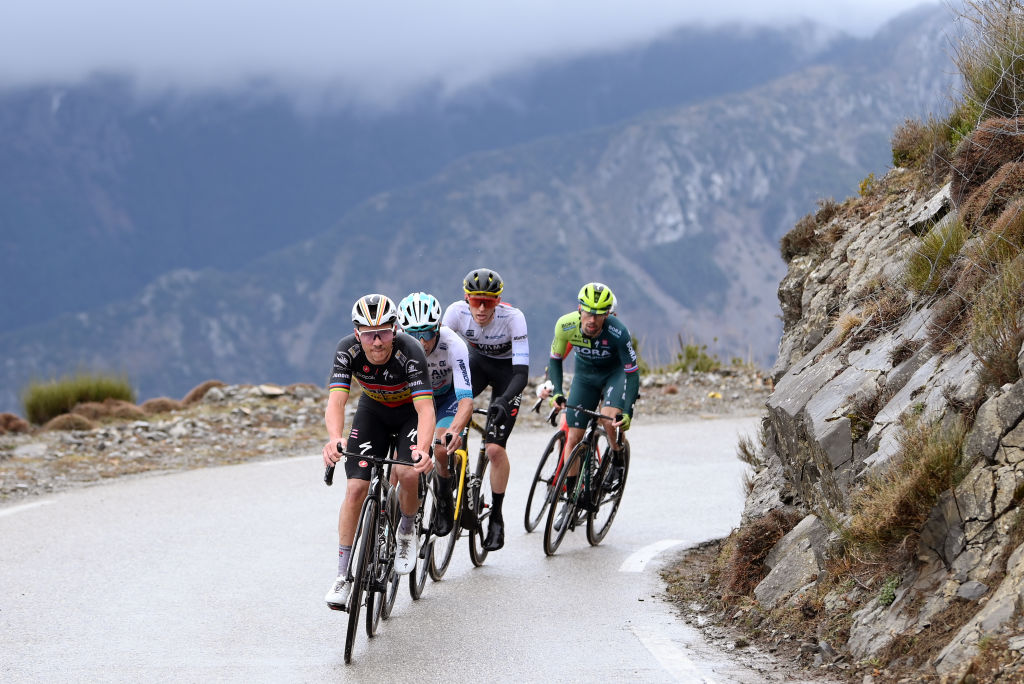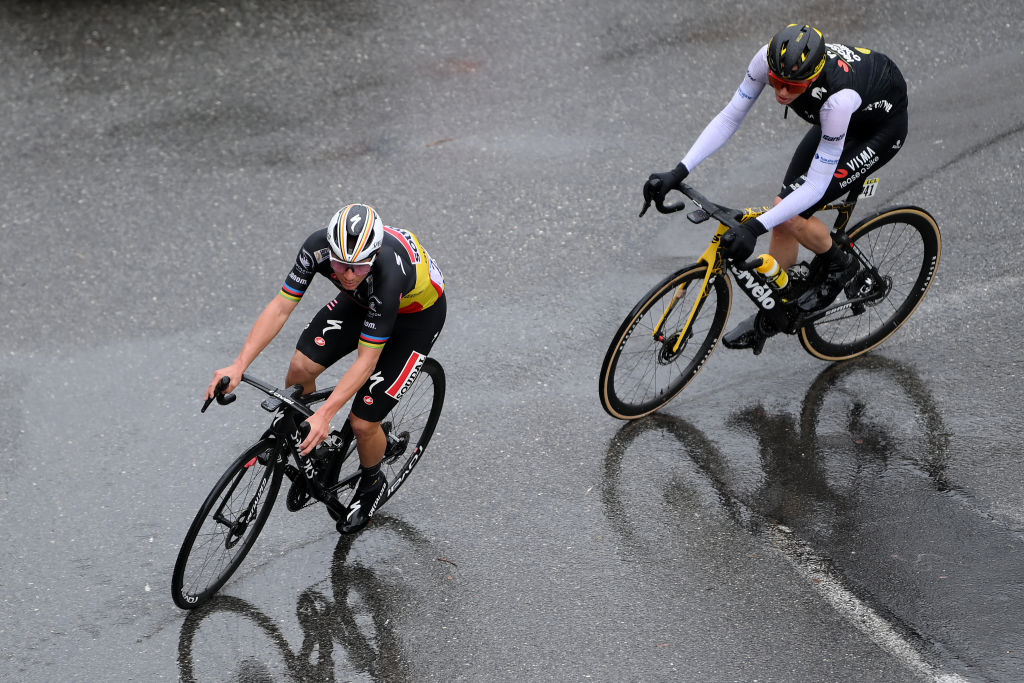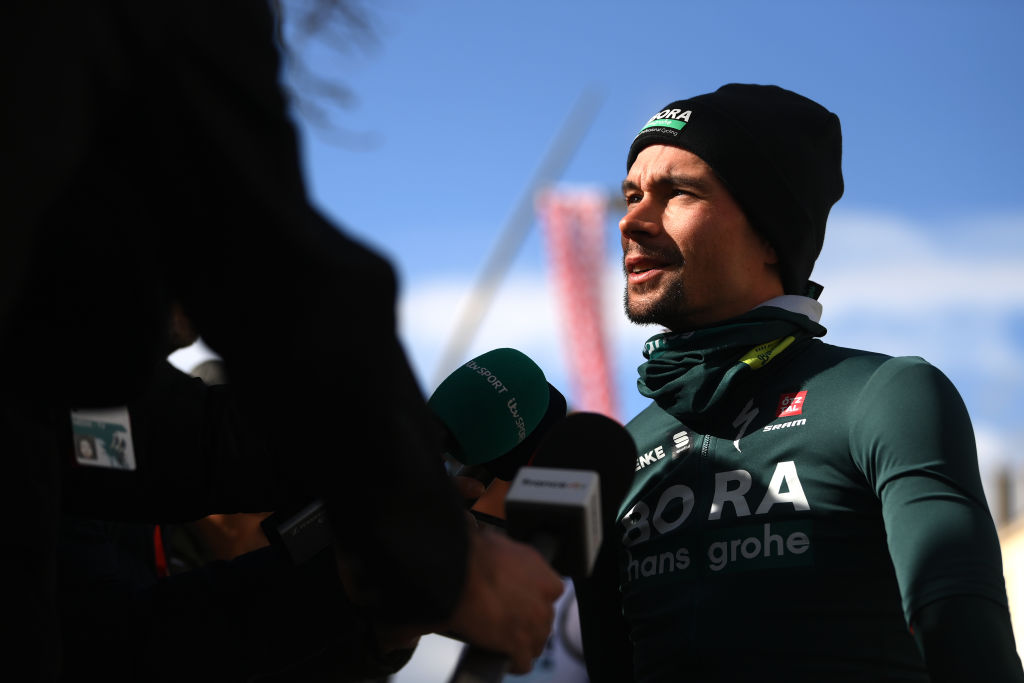
Professional cycling can be an intriguing mix of power, tactics and opportunities. All too often, though, it comes down to who is the strongest, either as an individual or as a team. Occasionally, however, even the biggest of favourites don’t quite get things right, and the race slips out of their fingers. There can be a number of reasons for that and the 82nd edition of Paris-Nice has shown quite a selection of them from riders we might have suspected to be above that kind of thing.
Before the start, everyone expected Primož Roglič to play his part and he did, just not in the category we were led to believe from previous years. Despite it being the first race of his 2024 campaign, everyone was convinced he would be ready to lead his new team Bora-Hansgrohe to a victory or, at the very least, a podium place. Winner two years ago and dominant in 2021 until a crash on the final stage saw him drop to 15th, Roglič knows how to ride the race.
March has always been one of his best months, because if he’s not bossing it in France, then he’s over at Tirreno-Adriatico winning there instead. On top of that, he needed a confidence-building result, not just for his own sake after leaving Jumbo-Visma, but also for a team that has invested in him as their Tour de France leader. Everything pointed to the Slovenian arriving in Paris ready for action.
The first stage saw him attentive enough, but lacking a bit of his usual power when he couldn’t immediately respond to accelerations from the likes of Egan Bernal and Remco Evenepoel. He was able to close down any gaps before they got really serious, so it looked like he was going to ride himself into that last bit of form as the week progressed and he might well have done if it had stayed reasonably dry. It didn’t, though, and disastrous choices in the pacing strategy during the team time trial on stage 3 put paid to any idea that he still might be the man to beat.
Roglič knows it’s a discipline where the strongest rider has to be careful to manage his teammates on the hardest sections, and the directors in the car know it’s their job to control the situation, so how did Bora find themselves with just two riders left with the team leader with more than half the course remaining? Was it Roglič’s reluctance to slow down because he was so used to the Visma speed or was it a lack of insight into the second half of the route?
I’m sure the pre-race briefing didn’t include the fiasco of losing their big powerhouses before they would have been at their most useful on the faster parts towards the finish. Bora messed up, and the resulting confusion translated precious into time lost which was going to be very difficult to regain.
Evenepoel
Over at Soudal-Quickstep, on the other hand, their reason for not being nearer to the UAE Team Emirates’ benchmark was certainly down to the rain they encountered. Never mind, because Remco had his angry face on, and that promised action aplenty for UAE to defend Brandon McNulty’s lead. Given the surfeit of talent lined up behind him, it ought to have been fairly controllable, but as is the way nowadays, stage 4 to Mont Brouilly saw things get pretty desperate with squabbling over time bonuses, Bora attacking on a wet descent and then Evenepoel putting the hurt on everyone before the penultimate climb.
UAE were exposed, with McNulty only having João Almeida left to chase Luke Plapp and Santiago Buitrago when they prised themselves from the lead group. The group of GC favourites then saw hesitations and brinkmanship over who was going to chase, and by the time panic had set in it was too late. Buitrago won the stage and Plapp took the yellow jersey, while Remco was predictably seething that he hadn’t gone with Plapp’s attack and that no one had wanted to work with him. This time, Soudal-Quickstep had messed up by having Louis Vervaeke drag Plapp clear before getting distanced.
On top of that, Evenepoel wasn’t able to make the difference nearer the top of the category 1 climb. His attacks were brutal enough, but they weren’t as stinging as they could have been, and it was almost as if he was afraid that a resurgent Roglič would counter him if the opportunity arose. To make matters worse, Mattias Skjelmose outsprinted the Belgian champion for the last bonus seconds, and you could sense the tension building in his demeanour as he started the feel they were all against him.
Roglič wasn’t out of it, Skjelmose was faster, Plapp was in great form, Ineos believed in Bernal and then there were guys like Felix Gall, Matteo Jorgensen and Buitrago to contend with. Remco’s self-belief and confidence looked to have taken a knock and frustration was building.

Two days later and his suspicions were right. Roglič attacked on the penultimate climb on the road to La Colle-sur-Loup on stage 6, and Evenepoel had to close it down, but then they both made the fatal error of letting Jorgensen, McNulty and Skjelmose escape. Jayco-Alula didn’t have the resources to help race leader Plapp, and Ineos were too busy rescuing Bernal who was suffering. Buitrago crashed on the next descent and Evenepoel only committed to a big acceleration once the finish was in sight.
Remco hadn’t seemed to notice that Roglič wasn’t at his best level and couldn’t or wouldn’t follow when you expected him to. Was the Slovenian bluffing, psyching him out and then going to pounce, or was he really at his limit? It was a good game either way, and Remco seemed so preoccupied by what Bora were doing, or not doing, that he had forgotten about McNulty and Jorgensen, who was ever present and had clearly stepped up a level.
On the penultimate day, meanwhile, Aleksandr Vlasov’s victory at La Madone d’Utelle re-established the worry that even a less than dynamic Roglič would finally show his cards on the concluding stage.
As ever, that short stage around Nice would decide things. After looking like he wasn’t going to win a stage or even make the podium Evenepoel’s aggression wore down his rivals and he crossed the line on the Promenade des Anglais with his arms aloft. Just behind him, however, was Matteo Jorgensen who was the GC victor and equal to everything that the Soudal-Quickstep man had thrown at him over the miserable 109km route of rain, relentless climbs and treacherous descents.
Brandon McNulty slipped from first to third place behind his fellow American and the Belgian superstar and despite leaving with second place, the mountains and points classifications, there’s the nagging feeling that he wasn’t entirely fulfilled by his first race in France. Individually and collectively, there are things to improve on.
For Roglič and Bora-Hansgrohe, it might not have been as disappointing as the final result suggests. Of course, there was the TTT fiasco, but they won a stage with Vlasov and though Roglič looked to be carrying a few kilos too many, he had to be happy as he saw the front of the race and influenced the outcome even if it was mostly by getting inside Evenepoel’s head.
The psychological game of the Tour de France is a long-term project, remember, and every encounter between the protagonists matters.

Report card
Elsewhere, Lidl-Trek may be slightly annoyed that Mads Pedersen didn’t get a stage win but that’ll be tempered by Mattias Skjelmose’s success on stage 6 and his GC performance. Luke Plapp showed why he joined Jayco Alula, making the most of the freedom now allowed him and doing so reminded everyone of the talent he has.
Bahrain-Victorious can thank Santiago Buitrago for his displays otherwise it was a pretty quiet race from them and the same goes for Felix Gall at Decathlon AG2R. If they had been relying on Sam Bennett, they were no doubt disappointed. The other top sprint transfer of Fabio Jakobsen didn’t work out much better for DSM-firmenich PostNL either.
A quick look at the team classification (fifth) confirms where Ineos Grenadiers are at the moment. For Egan Bernal, 7th overall and two fifth-place finishes on stages offered further encouragement as he rebuilds. But where was everyone else? Other than a few vanity pulls on the front to try to influence proceedings they didn’t have much effect when things got serious. They were on the back foot most of the time chasing breaks or rescuing situations.
Tudor Pro Cycling won a stage so that was their contract fulfilled, but everyone else got blasted by the weather and the race. Astana and Arkea were scraping over the mountains classification most of the time, but Remco plundered that from them on the last stage so they were present at the level expected from them. I can’t see Movistar, EF Education, Total Energies, Cofidis, Lotto-Dstny, Alpecin-Deceuninck or Israel-Premier Tech being in any way satisfied with their performances at Paris-Nice.
Groupama-FDJ were saved by Laurence Pithie’s spell in the race lead, but David Gaudu didn’t step up to the mark now he’s got sole GC responsibilities. Falling off while removing clothing is embarrassing to say the least.
UAE can be happy even if they came up short a few times. They had a solid collective at Paris-Nice and it will be more formidable when Tadej Pogačar is present. Brandon McNulty’s fine run of form from the beginning of the year continues, but Almeida is a slight concern.
Yet again, though, it’s the Visma-Lease a Bike squad that leaves with most of the spoils. Two stages with Olav Kooij and the overall with Matteo Jorgensen was more than they would have expected and is a sign that their successes continue through smart recruitment and development. And let’s not forget those helmets.







